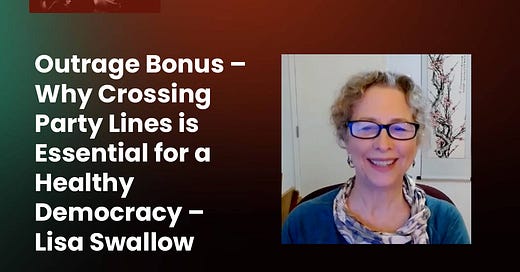In these highly charged times, when partisan animosity is at an all-time high, engaging with the "other side" can feel not just daunting, but like a waste of time. Many of us are yearning for immediate solutions and tangible actions to address the pressing issues we face, and the idea of listening to different political perspectives might seem like a luxury we can’t afford. However, it’s precisely in these moments of heightened tension that understanding and dialogue become even more crucial.
This week, we’re releasing a special bonus episode of the Outrage Overload Podcast that dives into the complexities of crossing party lines and having productive political conversations. In this episode, we speak with Lisa Swallow, the founder of Crossing Party Lines, a nonprofit dedicated to fostering civil political discourse. Since 2016, Lisa and her team have been equipping individuals with the tools and skills necessary to navigate these challenging discussions.
We understand that it’s challenging to prioritize dialogue when immediate action feels so necessary. Yet, we believe that these conversations are a crucial part of creating long-term change. By fostering understanding and building bridges, we can strengthen our communities and work together more effectively.
We invite you to listen to this episode, not as a platitude, but as a step towards finding common humanity and making a real impact.
Tune in to the episode here, and let us know your thoughts. Share the episode with friends, join the conversation on social media, and consider getting involved with Crossing Party Lines through their Meetup and workshops.
Thank you for being a part of our community and for your commitment to fostering understanding in these challenging times.
Best regards,
David Beckemeyer
Host and Creator
New This Week in Outrage Episode!
This episode takes a more serious turn as we examine Agenda 47, the policy agenda proposed by Donald Trump for his 2024 presidential campaign. We'll be discussing its details and implications as outlined in the series of videos on his website.
Agenda 47: Authoritarian Aspirations - 7/7/2024
This episode is a bit more serious than most, where we discuss at some length Agenda 47, the policy agenda proposed by Donald Trump for his 2024 presidential campaign outlined in a number of videos on his website. This week, Lisa and David also talk about California heat wave, hurricane Beryl made landfall in Texas; Steve Bann…
This in-depth discussion, starting around the 18-minute mark, explores the potential implications of Trump’s plans, should he regain the presidency.
Agenda 47: Unchecked Executive Power
Potential Implications: Agenda 47 proposes expanded presidential powers, including impoundment power and increased control over federal agencies. This could lead to reshaping the federal budget based on personal or political preferences, bypassing legislative oversight, and diminishing congressional power, which could weaken democratic governance.
Counterpoint: The Constitution gives Congress the power of the purse. The Supreme Court (SCOTUS) has struck down actions that overreach this power, as seen with Biden's student loan forgiveness plan. SCOTUS is likely to be skeptical of similar actions by Trump, ensuring that checks and balances remain intact.
Impact on the Free Press
Potential Implications: Trump’s proposals to change libel laws could lead to increased litigation against journalists and news organizations, deterring critical reporting and compromising the media’s ability to hold public figures accountable.
Counterpoint: Changing libel laws is unlikely, as media outlets like Fox News and One America would pressure the GOP to abandon such changes to avoid being sued easily.
Section 230 and Social Media
Potential Implications: Revising or repealing Section 230 could lead to increased censorship of critical content and more leniency towards misinformation, affecting the quality and reliability of information on social media.
Counterpoint: There is no consensus in either party on how to change Section 230, and the GOP is unlikely to eliminate the filibuster, making it difficult to achieve the necessary 60 votes for changes.
Use of the Justice Department
Potential Implications: Trump could misuse the DOJ to target political opponents, creating a Truth and Reconciliation Commission to expose alleged abuses by the "deep state."
Counterpoint: Such actions could be seen as private acts, leading to prosecution. Trump cannot enact treason laws or execute people without due process, and these measures would face significant legal challenges.
Federal Workforce and Schedule F
Potential Implications: Re-implementing "Schedule F" would allow Trump to replace career civil servants with loyalists, reducing internal resistance to his policies.
Counterpoint: Schedule F is likely to face court challenges. Additionally, finding competent individuals to fill these positions is challenging, and incompetent governance would hurt the GOP’s electoral prospects. Bureaucracies can resist through leaks and slow-walking actions.
Law and Order Policies
Potential Implications: Aggressive measures against undocumented immigrants could lead to human rights and civil liberties violations, characterizing the administration as a police state.
Counterpoint: Implementing these measures would require significant resources and time, facing court and legislative scrutiny. Military and law enforcement agencies adhere to constitutional principles, and federal law enforcement cannot dictate local policing practices.
Potential Consequences
Potential Implications: Unchecked executive power could fundamentally alter the balance of power in the U.S. government, eroding democratic norms and creating instability in governance.
Counterpoint: The likelihood of these actions occurring is low due to the many checks and balances in place at local, national, congressional, military, and judicial levels.
In Summary This episode of ‘This Week in Outrage’ provides a brief overview of Trump’s Agenda 47, highlighting some of the more glaring potential risks of an executive branch with unprecedented power. Tune in to explore these critical issues and their implications for the future of American democracy.





